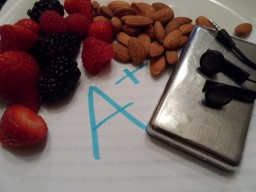By Li Han
Studies have shown that some foods help stimulate brain function. Students need to know this information to perform well in school.
Fruits like apples and berries contain antioxidants and phytonutrients that improve blood flow to the brain, which improves opportunities for learning.
May Sanicola, learning specialist for TRIO at CSN suggests, “Fatty foods, although delicious, will only serve to make you feel sluggish.” So skip out on foods like lasagna, fettuccini and white bread. Instead, eat whole-grain foods like whole oats, brown rice, and even snacks like popcorn.
“Stick with foods that are high in fiber and complex carbohydrates,” Sanicola continues. “Complex carbs take longer for your body to break down, therefore letting you feel satiated for lengthier periods of time. This will fuel your brain for longer periods,” Sanicola says.
According to food writer Sera Filson, food provides nutrients for the brain. A brain on junk food suffers from malnutrition, but a brain on high-nutrient foods can flourish.
“Keep in mind that all cells need nutrients to continue their growth. This means your brain needs foods that will give it the building blocks it needs to work right. When you have more neurons and connections within your brain, it means you have a stronger memory and your mind can work better” according to Filson’s article on Pick the Brain.com.
Fish and nuts are high in Omega 3, which supplies the brain with energy and healthy fats.
Whole grains heighten memory. Fruits and vegetables provide minerals and vitamins. Chocolate contains cocoa, which is an antioxidant. Grapes, tea, and red wine have flavanols that assist in regaining mild memory loss.
Students who pack their lunches with nutrient-rich foods can increase their brain power and abilities.
“For a quick breakfast to go, take a banana and yogurt. Pack a bag of grapes and take a nutrition bar. That will make your stomach feel full and make you think better,” CSN Student Fabiola Marzano says.




